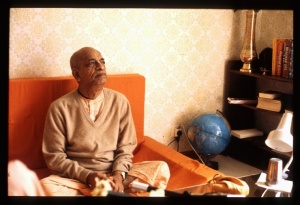SB 9.4.29: Difference between revisions
m (1 revision(s)) |
(Vanibot #0054 edit - transform synonyms into clickable links, which search similar occurrences) |
||
| (One intermediate revision by one other user not shown) | |||
| Line 1: | Line 1: | ||
{{info | {{info | ||
|speaker= | |speaker=Śukadeva Gosvāmī | ||
|listener=King | |listener=King Parīkṣit | ||
}} | }} | ||
[[Category:Srimad-Bhagavatam - Canto 09 Chapter 04]] | |||
[[Category:Bhagavatam Verses Spoken by Sukadeva Gosvami - Vanisource|090429]] | |||
<div style="float:left">'''[[Srimad-Bhagavatam]] - [[SB 9|Ninth Canto]] - [[SB 9.4: Ambarisa Maharaja Offended by Durvasa Muni|Chapter 4: Ambarīṣa Mahārāja Offended by Durvāsā Muni]]'''</div> | |||
<div style="float:right">[[File:Go-previous.png|link=SB 9.4.28]] '''[[SB 9.4.28]] - [[SB 9.4.30]]''' [[File:Go-next.png|link=SB 9.4.30]]</div> | |||
{{RandomImage}} | |||
==== TEXT 29 ==== | ==== TEXT 29 ==== | ||
<div | <div class="verse"> | ||
ārirādhayiṣuḥ kṛṣṇaṁ | :ārirādhayiṣuḥ kṛṣṇaṁ | ||
mahiṣyā tulya-śīlayā | :mahiṣyā tulya-śīlayā | ||
yuktaḥ sāṁvatsaraṁ vīro | :yuktaḥ sāṁvatsaraṁ vīro | ||
dadhāra dvādaśī-vratam | :dadhāra dvādaśī-vratam | ||
</div> | </div> | ||
| Line 17: | Line 22: | ||
==== SYNONYMS ==== | ==== SYNONYMS ==== | ||
<div | <div class="synonyms"> | ||
''[//vanipedia.org/wiki/Special:VaniSearch?s=ārirādhayiṣuḥ&tab=syno_o&ds=1 ārirādhayiṣuḥ]'' — aspiring to worship; ''[//vanipedia.org/wiki/Special:VaniSearch?s=kṛṣṇam&tab=syno_o&ds=1 kṛṣṇam]'' — the Supreme Lord, Kṛṣṇa; ''[//vanipedia.org/wiki/Special:VaniSearch?s=mahiṣyā&tab=syno_o&ds=1 mahiṣyā]'' — with his queen; ''[//vanipedia.org/wiki/Special:VaniSearch?s=tulya&tab=syno_o&ds=1 tulya]-[//vanipedia.org/wiki/Special:VaniSearch?s=śīlayā&tab=syno_o&ds=1 śīlayā]'' — who was equally as qualified as Mahārāja Ambarīṣa; ''[//vanipedia.org/wiki/Special:VaniSearch?s=yuktaḥ&tab=syno_o&ds=1 yuktaḥ]'' — together; ''[//vanipedia.org/wiki/Special:VaniSearch?s=sāṁvatsaram&tab=syno_o&ds=1 sāṁvatsaram]'' — for one year; ''[//vanipedia.org/wiki/Special:VaniSearch?s=vīraḥ&tab=syno_o&ds=1 vīraḥ]'' — the King; ''[//vanipedia.org/wiki/Special:VaniSearch?s=dadhāra&tab=syno_o&ds=1 dadhāra]'' — accepted; ''[//vanipedia.org/wiki/Special:VaniSearch?s=dvādaśī&tab=syno_o&ds=1 dvādaśī]-[//vanipedia.org/wiki/Special:VaniSearch?s=vratam&tab=syno_o&ds=1 vratam]'' — the vow for observing Ekādaśī and Dvādaśī. | |||
</div> | </div> | ||
| Line 24: | Line 29: | ||
==== TRANSLATION ==== | ==== TRANSLATION ==== | ||
<div | <div class="translation"> | ||
To worship Lord Kṛṣṇa, Mahārāja Ambarīṣa, along with his queen, who was equally qualified, observed the vow of Ekādaśī and Dvādaśī for one year. | To worship Lord Kṛṣṇa, Mahārāja Ambarīṣa, along with his queen, who was equally qualified, observed the vow of Ekādaśī and Dvādaśī for one year. | ||
</div> | </div> | ||
| Line 31: | Line 36: | ||
==== PURPORT ==== | ==== PURPORT ==== | ||
<div | <div class="purport"> | ||
To observe Ekādaśī-vrata and Dvādaśī-vrata means to please the Supreme Personality of Godhead. Those interested in advancing in Kṛṣṇa consciousness must observe Ekādaśī-vrata regularly. Mahārāja Ambarīṣa's queen was equally as qualified as the King. Therefore it was possible for Mahārāja Ambarīṣa to engage his life in household affairs. In this regard, the word tulya-śīlayā is very significant. Unless a wife is equally as qualified as her husband, household affairs are very difficult to continue. Cāṇakya Paṇḍita advises that a person in such a situation should immediately give up household life and become a vānaprastha or sannyāsī: | To observe Ekādaśī-vrata and Dvādaśī-vrata means to please the Supreme Personality of Godhead. Those interested in advancing in Kṛṣṇa consciousness must observe Ekādaśī-vrata regularly. Mahārāja Ambarīṣa's queen was equally as qualified as the King. Therefore it was possible for Mahārāja Ambarīṣa to engage his life in household affairs. In this regard, the word ''tulya-śīlayā'' is very significant. Unless a wife is equally as qualified as her husband, household affairs are very difficult to continue. Cāṇakya Paṇḍita advises that a person in such a situation should immediately give up household life and become a ''vānaprastha'' or ''sannyāsī:'' | ||
:mātā yasya gṛhe nāsti | :''mātā yasya gṛhe nāsti'' | ||
:bhāryā cāpriya-vādinī | :''bhāryā cāpriya-vādinī'' | ||
:araṇyaṁ tena gantavyaṁ | :''araṇyaṁ tena gantavyaṁ'' | ||
:yathāraṇyaṁ tathā gṛham | :''yathāraṇyaṁ tathā gṛham'' | ||
A person who has no mother at home and whose wife is not agreeable with him should immediately go away to the forest. Because human life is meant for spiritual advancement only, one's wife must be helpful in this endeavor. Otherwise there is no need of household life. | A person who has no mother at home and whose wife is not agreeable with him should immediately go away to the forest. Because human life is meant for spiritual advancement only, one's wife must be helpful in this endeavor. Otherwise there is no need of household life. | ||
</div> | </div> | ||
__NOTOC__ | |||
<div style="float:right; clear:both;">[[File:Go-previous.png|link=SB 9.4.28]] '''[[SB 9.4.28]] - [[SB 9.4.30]]''' [[File:Go-next.png|link=SB 9.4.30]]</div> | |||
__NOTOC__ | |||
__NOEDITSECTION__ | |||
Latest revision as of 23:58, 18 February 2024

A.C. Bhaktivedanta Swami Prabhupada
TEXT 29
- ārirādhayiṣuḥ kṛṣṇaṁ
- mahiṣyā tulya-śīlayā
- yuktaḥ sāṁvatsaraṁ vīro
- dadhāra dvādaśī-vratam
SYNONYMS
ārirādhayiṣuḥ — aspiring to worship; kṛṣṇam — the Supreme Lord, Kṛṣṇa; mahiṣyā — with his queen; tulya-śīlayā — who was equally as qualified as Mahārāja Ambarīṣa; yuktaḥ — together; sāṁvatsaram — for one year; vīraḥ — the King; dadhāra — accepted; dvādaśī-vratam — the vow for observing Ekādaśī and Dvādaśī.
TRANSLATION
To worship Lord Kṛṣṇa, Mahārāja Ambarīṣa, along with his queen, who was equally qualified, observed the vow of Ekādaśī and Dvādaśī for one year.
PURPORT
To observe Ekādaśī-vrata and Dvādaśī-vrata means to please the Supreme Personality of Godhead. Those interested in advancing in Kṛṣṇa consciousness must observe Ekādaśī-vrata regularly. Mahārāja Ambarīṣa's queen was equally as qualified as the King. Therefore it was possible for Mahārāja Ambarīṣa to engage his life in household affairs. In this regard, the word tulya-śīlayā is very significant. Unless a wife is equally as qualified as her husband, household affairs are very difficult to continue. Cāṇakya Paṇḍita advises that a person in such a situation should immediately give up household life and become a vānaprastha or sannyāsī:
- mātā yasya gṛhe nāsti
- bhāryā cāpriya-vādinī
- araṇyaṁ tena gantavyaṁ
- yathāraṇyaṁ tathā gṛham
A person who has no mother at home and whose wife is not agreeable with him should immediately go away to the forest. Because human life is meant for spiritual advancement only, one's wife must be helpful in this endeavor. Otherwise there is no need of household life.